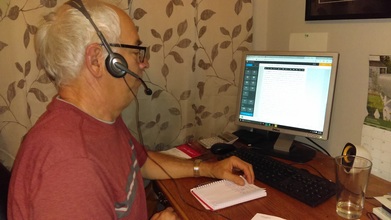 Me, blogging away.
Me, blogging away. The following are approaches I have tried when I feel I'm regressing or not making progress with my speech, especially in enunciation and the jaw muscle coordination involved in stringing successive words together. Since this is partly a therapeutic blog, I will further delve into the challenges a stroke survivor, with left sided brain damage, has when trying to speak clearly and fluently.
I practice enunciation when I create stories for the blog using my Dragon Naturally Speaking software. It's a voice activated program that enables one to dictate into a microphone and get written results. In conjunction with any PC or laptop, device users then have the ability to produce documents, attach video or photos. Only it is voice activated.
When using the Dragon program, I find I must enunciate carefully by voicing each syllable as it should be spoken. Ho-li-day, fe-ste-vi-ties. This is great therapy for my apraxia since it loosens up the jaw muscles. Generally, I first imagine myself saying the words and then forcing my mouth to move. Over time, I have gotten better, and the program recognizes my dictation a lot faster.
Dragon Naturally Speaking clearly gives me an opportunity to try to entertain myself and others. And as a teacher, I have always enjoyed that. So I created an opportunity for myself – this blog – to tell my stroke story from the point of view of an active survivor who sees everything as sport. It's turned into a lot of hard work, both spiritually, emotionally, and physically – just like sport.
Another thing I try to do to improve my speaking is to sing along with Pandora. At least once a day and sometimes more, if I am feeling up to it, I give it a shot. This is a great practice for fluency. My favorite songs are by John Denver and Bonnie Raitt. Their words are simple and familiar. Because if I know the tunes, I can just fill in the lyrics as I read them. And that's the great thing about Pandora, the lyrics for most songs appear on the screen and make it easier to sing along.
 The Event!
The Event! So next time you're in a noisy place where nobody can hear themselves, much less carry on a normal conversation, think to yourself, "This is the perfect opportunity for yelling!" Then yell out to your mate, "The band is pretty awesome. The Brew is great!" Or something like, "Get me another tapa, por favor! And a dessert while you're at it!" Anything yelled will give the opportunity to use a full voice and express oneself in an uninhibited fashion.
At the Goya event, I was able to get around pretty good on my cane. In the gallery area everybody was strolling and stopping to view art, unless they were in line to get tapas or drinks, dancing, or just milling around deciding what they wanted to do while the music blared and people gabbed away. Everything in the museum was slow moving, so I fit in just fine. I was getting in and out of crowds pretty well. I created disturbances in the knots of people by yelling, "Excuse me!" When they saw the cane coming or heard its distinctive stiff rattle, people parted in front of me.
We live in a society where speech and language can be keys to opening the doors of a good life. A new life can be rediscovered by stroke survivors, their family and friends.
 RSS Feed
RSS Feed
